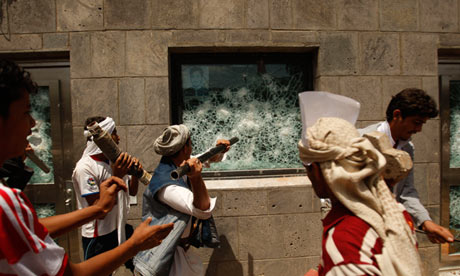By Justin Dorman
Impunity Watch Reporter, Middle East
SANA’A, Yemen – While the reaction to the American-made film Innocence of Muslims has certainly cooled down when compared to the massive riots that swept the Middle East a month ago, anti-American sentiment is still alive and well in Yemen. Qassem Aqlan, a Yemeni security official to the U.S. Embassy in Sana’a, was killed Thursday. Many believe he was overseeing the investigation into last month’s attack on the embassy.

Aqlan had been a security official there for almost two decades. He was assassinated by a masked gunman on a motorcycle. Aqlan was on his way to work and was not far from his home. The shooting occurred on Siteen, a main street in the capital that many consider to be one of the safest in the entire country.
“We are deeply saddened by this tragic incident involving a Yemeni employee of our embassy in Sana’a, and we are working with Yemeni authorities,” a senior official in the U.S. State Department told reporters.
It is still unknown who was behind the killing. Yemeni officials believe it to be the work of al Qaeda in the Arabian Peninsula (AQAP), who have been blamed for many attacks that have taken place in in the coastal country. A senior Interior Ministry official stated that “[m]otorcycle attacks are currently al Qaeda’s main tactic” because they, “are easier for terrorists to coordinate and plan for.” The U.S. government currently regards AQAP as the most dangerous offshoot of the al Qaeda network.
Backed by the United States, Yemen has been on the offensive to push AQAP out of the mountainous areas in the south, where the group has been performing murders and suicide missions. The government believes the recent assassination of Aqlan to be a means of retaliation. It also also thinks that AQAP has been behind numerous other recent attacks on Yemeni intelligence, military, and security officials. Just two weeks ago, Colonel Abdullah al-Ashwal, a top intelligence official, was murdered in a drive-by assassination.
The anti-Muhammad film, Innocence of Muslims, incensed Muslims all across the Middle East. AQAP has attempted to use that sentiment to its advantage by calling for attacks on U.S. embassies. When Christopher Stevens, the U.S. Ambassador to Libya, was killed at the U.S. consulate in Benghazi, AQAP extolled it as, “the best example” for those attacking embassies to follow.
It appears as if no one is safe from harm if you are connected to the U.S. Embassy in Yemen, or an investigation into attacks on it. It does not matter if you are Yemeni or Muslim.
An official was quoted saying that Aqlan’s death, “sends a message that if you’re working with the Americans you’ll be targeted no matter who you are.”
For further information, please see:
Alsahwa – Investigation Officer of U.S. Embassy Assassinated in Sana’a – 11 October 2012
CNN – Security Official for U.S. Embassy in Yemen Killed – 11 October 2012
Guardian – Yemeni Security Official for US Embassy Killed in Drive-by Shooting – 11 October 2012
Middle East Online – Gunmen Kill Yemeni Security Staff at U.S. Embassy – 11 October 2012



